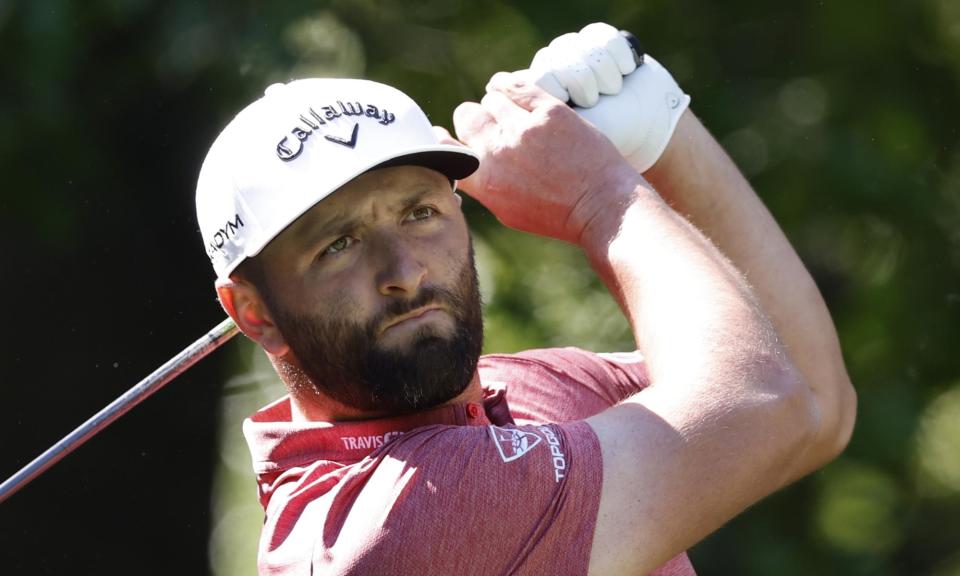Golf’s warring factions miss merger deadline day to leave future still in flux

The concept of peace in our golfing time was always more interesting than the level of detail required to turn that dream into a reality. The sporting world was rocked by the announcement on 6 June that the PGA Tour, DP World Tour and Saudi Arabia’s Public Investment Fund would combine to form a new entity. Vitriol attached to LIV’s march on to the scene would supposedly vanish on the basis those controlling the elite game had decided to kiss and make up.
Another date, 31 December, became key. The parties had identified the end of 2023 as the cut-off point to turn a framework agreement into something binding. This always looked a hugely optimistic target.
Related: Viktor Hovland says he has no plans to join LIV Golf but attacks PGA ‘arrogance’
The new year will come and go without a proper outline of the future. Those with knowledge of the continuing discussions point out 31 December was a loose target rather than a legally enforceable necessity. This deadline could always be extended, whether anybody chooses to announce that or not.
A further element of complication arrived after Fenway Sports Group, keen to add to a portfolio that includes Liverpool FC, joined the talks. Fenway’s arrival is a huge boost to the PGA Tour not only on the basis of providing equity and legitimacy beyond golf, but potentially minimising the influence PIF can have.
The PGA Tour has always seemed perfectly keen to take the Saudi dollar while wanting to remain in complete control of golf’s upper echelons. However, for this ambition to come true PIF has to be content with the role of sleeping partner. It would be a strange approach for a group bearing billions of dollars.
“We’re confident that we’re going to reach a positive outcome for the PGA Tour,” said Jay Monahan, the organisation’s commissioner, when he last addressed the media in August. This is fundamentally different from reaching a positive outcome for the entire game. When the Saudis coaxed Jon Rahm to LIV in recent weeks, it was their latest statement of intent. Ignore them at your peril.
While hope is strong there will be a detailed alliance and fresh investment before too long, it could take two years for the organisational form to be clear. Schedules are already set for 2024. The key element involves where and if LIV fits into a collective future, given calendar challenges that already exist.
LIV has served a purpose but is also the baby of a Saudi regime who will not be easily convinced to cut it off. The PGA and DP World Tours must determine how players who switched to LIV can, if they choose, return without causing ructions among members who stayed loyal.
The path towards redemption is a rocky one. The DP World Tour’s chief executive, Keith Pelley, has been conspicuously quiet but must be working to ensure the strategic alliance he formed with the PGA Tour bears fruit as the sport plots its next few decades. Professional golf in Europe is too important to be left behind.
Monahan finds himself in such an invidious position it is difficult to foresee him remaining in post for too long. Before LIV’s arrival, he was broadly regarded as the finest leader of a US-based sporting entity. His status has been horribly undermined by the staunch position that no player should be dealing with the rebel tour – including on moral grounds – immediately before the PGA Tour jumped into a bunker with PIF.
“Do as I say, not as I do” leadership will never prevail. Similar intrigue surrounds Greg Norman, who has clung on to his role front and centre at LIV despite routine speculation he would be moved on. Norman could legitimately ride off into the sunset at any point while stating he had done his job in respect of taking a wrecking ball to the traditional and complacent ecosystem. It just helped that the Australian had bottomless pits of money to do so.
A group of rank and file PGA Tour players remain unhappy with their lot. Apparent secrecy from those on the tour’s board has irked some. The gripe is a strange one: no organisation the size of the PGA Tour can reasonably be expected to involve every member in decision making. Directors are elected for a reason.
Yet this speaks to a broader picture, where entitled players demand more, more and more. The prize funds they compete for, especially on the PGA Tour, are wildly high.
The PGA Tour will emerge from cold storage in Maui this week. Ludvig Åberg, keen to continue his rapid rise to prominence, is among the headline acts. Endearing stories such as Åberg’s still exist, it is just that they have been overtaken by dollar signs and boardroom machination. Golf remains in a state of flux.

 Yahoo Sport
Yahoo Sport 



































































